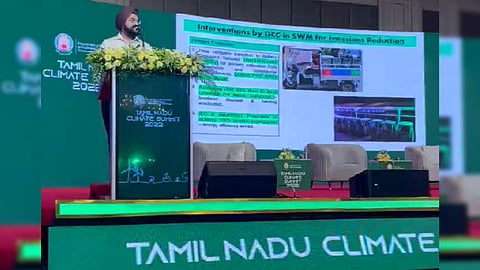

CHENNAI: Eyeing to process all the wet waste generated in the city, the Greater Chennai Corporation has plans to increase its bio-CNG processing capacity to 1,700 tonnes per day from existing 200 tonnes per day.
Speaking on 'Achieving state's goal on emission reduction through effective waste management' on the second day of Tamil Nadu Climate Summit 2022, Gagandeep Singh Bedi, Chennai Corporation Commissioner, said that the city has two bio-CNG plants with a combined capacity of processing 200 tonnes of wet waste every day and measures are ongoing to install bio-CNG plants with a total capacity of 500 tonnes per day.
"We can not completely close down our dumping yards as we need some place to dump inert waste. But, we are going to construct 500 tonnes (per day) bio-CNG plants in north Chennai and another 500 tonnes bio-CNG plants in south Chennai. These facilities will process 1,700 tonnes of wet waste. With other methods of wet waste processing, the city will process all its wet waste," he said.
Of the 5,500 tonnes of garbage generated in the city every day, around 50 per cent is wet waste.
He explained that carbon dioxide emission occurs while using vehicles for garbage collection and transportation. The civic body is already using battery-operated vehicles for door-to-door collection and night conservancy has been intensified to save fuel by avoiding traffic congestion. "Presently, door-to-door collection has reached 95 per cent and in the next two to three years, number of garbage bins will be reduced significantly. Around 70 per cent conservancy works are being done during night hours," he said.
He further explained the gathering that bio-mining of legacy waste in dumping yards will reduce the carbon dioxide emission. By the end of 2023, bio-mining in Perungudi will be completed and 200 acres of land will be reclaimed. Similarly, bio-mining in Kodungaiyur will be completed by 2025 and 250 acres will be reclaimed, he added.
Apart from augmenting bio-CNG capacity, the city has plans to process 20 tonnes of plastic waste every day into light diesel oil, which can be used as alternate fuel. It may be noted that the civic body is already sending plastic and other combustible waste to cement factories to be used as alternate for coal.
"In my opinion, we are going in right direction. In two to three years, you will see a change in the way that solid waste managed in the city," he assured.
Visit news.dtnext.in to explore our interactive epaper!
Download the DT Next app for more exciting features!
Click here for iOS
Click here for Android